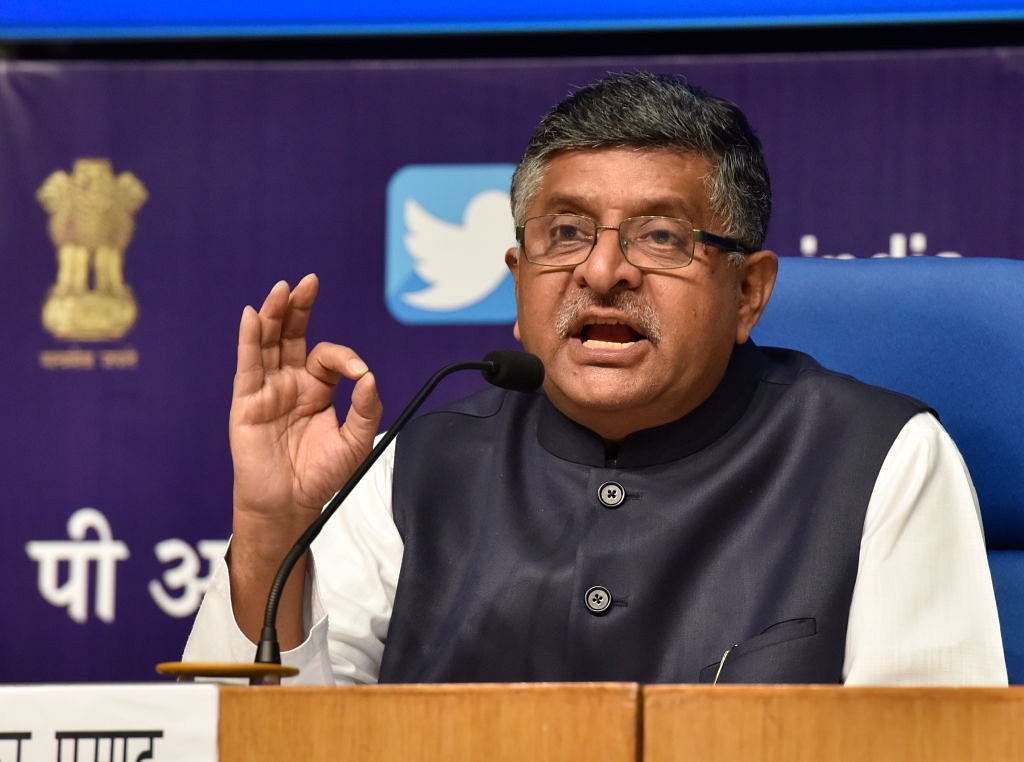Ideas
Why Entrance Exams And SC/ST Quotas In Lower Judiciary Are Ideas Worth Trying
- It is a good idea, if the government can get other political parties to legislate it. But in election season, one cannot bet on any such healthy development.

Union Law Minister Ravi Shankar Prasad speaks at an event in New Delhi. (Sanjeev Verma/Hindustan Times via GettyImages)
Union Law Minister Ravi Shankar Prasad set the cat among judicial pigeons when he suggested that there could be reservations for Scheduled Caste (SC) and Scheduled Tribe (ST) candidates in the lower judiciary.
The Times of India quotes him as saying that a judicial services exam can be conducted on the lines of those conducted for the civil services, with reservations being part of the deal. “Those selected,” said Prasad, “can be allotted states to serve in and reservation will create opportunities for well-trained judicial officers from deprived sections who will, over time, rise to higher positions”.
In theory, those who propose the merit argument to demand a gradual phaseout of reservations and quotas should be on strong ground here too. After all, don’t you need the best people in this most sensitive of appointments in a democracy?
But, especially in a democracy, the merit argument needs to be weighed against the socially important need to provide representation and voice to the marginalised. In the case of the judiciary, the merit argument makes even less sense since that is not the only criterion for choosing judges .
Even today, judges are chosen on arbitrary notions of merit as decided by the judiciary itself; some of the judges elevated to the Supreme Court tend to be relatives of powerful former judges or senior counsel or politicians. Thus, the previous Chief Justice of India (CJI), Dipak Misra, was the nephew of a former CJI, Ranganath Misra. A future CJI, D Y Chandrachud, who could rise to the top office in 2022, is the son of former CJI Y V Chandrachud. The current Chief Justice Ranjan Gogoi is the son for a former Chief Minister of Assam.
Worse, the Supreme Court has rarely seen SC/STs rising through the ranks, with only one – K G Balakrishnan – becoming CJI. As for women, there have been precisely six of them, including current sitting women judges, in India’s independent history.
In the lower judiciary, political connections seem to matter for judicial appointments. In a blog written in 2014, former Supreme Court judge Markandey Katju revealed that three former CJIs were complicit in allowing a corrupt additional judge of the Madras High Court to continue in office as politicians were backing the judge. Justice C S Karnan, who courted notoriety by openly threatening the then Madras High Court Chief Justice, Sanjay Kaul, for contempt in 2015, and later (in 2017) ordered the arrest of the Supreme Court Chief Justice and some other brother judges when they tried to restrain him, was an All India Anna Dravida Munnetra Kazhagam booth worker at one point of time.
One can cite other instances, but the broad point is this: merit isn’t the only criteria for judicial appointments. So, when Prasad proposes the holding of examinations for entry to the lower judiciary level, he is actually cutting down the scope for political patronage. And even if there are reservations for SC/ST entrants, it only means a small advantage for such candidates to enter judicial service, as is the case in civil services. They still will need to clear a minimum level in these exams.
The judiciary did not take kindly to the earlier Narendra Modi government attempt to create a National Judicial Appointments Commission to vet and suggest names for the higher judiciary. So, one can expect resistance to any idea that will take appointments to the lower judiciary out of the hands of state-level judges and politicians.
It is a good idea, if the government can get other political parties to legislate it. But in election season, one cannot bet on any such healthy development.
Support Swarajya's 50 Ground Reports Project & Sponsor A Story
Every general election Swarajya does a 50 ground reports project.
Aimed only at serious readers and those who appreciate the nuances of political undercurrents, the project provides a sense of India's electoral landscape. As you know, these reports are produced after considerable investment of travel, time and effort on the ground.
This time too we've kicked off the project in style and have covered over 30 constituencies already. If you're someone who appreciates such work and have enjoyed our coverage please consider sponsoring a ground report for just Rs 2999 to Rs 19,999 - it goes a long way in helping us produce more quality reportage.
You can also back this project by becoming a subscriber for as little as Rs 999 - so do click on this links and choose a plan that suits you and back us.
Click below to contribute.
Latest